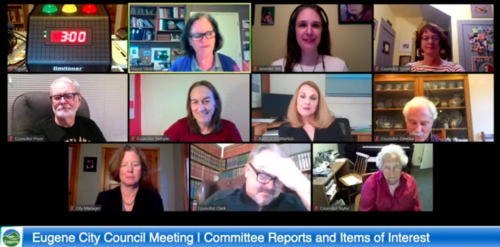
Eugene residents testified at a remote City Council meeting about the city’s short-term rental (STR) ad hoc committee and the city’s strategy to support the unhoused during the COVID-19 pandemic.
The May 11 public forum prompted differences of opinion over the composition of the STR committee as well as its timeline. Confusion about the intended purpose of the STR ad hoc committee was addressed by city manager pro tem Sarah Medary.
The STR ad hoc committee was formed after the City Council received a wave of opposing feedback from the community about a draft ordinance increasing regulations of short term rentals in December, 2019. According to the city website, city staff created the ad hoc committee to give impacted residents a chance to respond to the proposed ordinance before a decision is made by City Council.
According to the city website, the draft ordinance includes licensing restrictions and a yearly licensing fee. It would also require the short-term rental property is owner-occupied and include parking requirements.
During the public forum, community members such as Katheryn Dunn, a real estate agent in Eugene, urged councilors to pause the ad hoc committee and remove housing advocates and hotel operators from the group.
Eugene resident Valorie Harris reiterated Dunn’s concerns in her testimony. “This committee is very dysfunctional,” Harris said. “Everyone is in their respective corners.” Harris asked City Council to disband the committee and focus on responding to the COVID-19 pandemic.
Jojo Jensen, an impacted neighbor on the ad hoc committee, testified against disbanding the group. “I don’t believe that kicking short term rental regulations down the road, until after our current situation is resolved, is really a viable option,” she said.
Medary addressed confusion surrounding the purpose of the ad hoc committee after the public forum. She said the committee was not set up to “come up with a set of recommendations,” but to give feedback on the proposed regulations.
On May 20, the council will be presented with the option to move forward with the STR regulation ordinance, or wait until a later date, according to Medary.
“We’ll be back on the 20th and you’ll have a set of options. I think we’ll get a nice reset from that,” Medary said.
Councilors and community members at the meeting also expressed concern about shelter services for unhoused residents during the pandemic.
The city of Eugene, in coordination with community partners in Lane County and Springfield, developed a temporary emergency shelter and support plan to help the unhoused community follow CDC guidelines during the public health crisis.
The plan includes 58 hand washing stations and 73 portable restrooms across Eugene, and four designated temporary shelter sites, according to the city website. Lane County has also partnered with community groups to set up two respite sites at the fairgrounds in Eugene and the Memorial Building in Springfield, according to a March 27 city newsletter.
Kris McAlister, the manager of the respite site in Springfield, testified about his experience during the public forum. “Our people, our community members, our unhoused and our elders have all risen to the occasion and helped make this shelter possible.”
McAlister said the Springfield respite center is not able to house everyone seeking shelter. The overflow of unhoused residents in the area has caused the shelter to be criticized by media and business owners, McAlister said. McAlister is a candidate for the Springfield City Council.
Eugene City Councilor Emily Semple said she and Mayor Lucy Vinis visited the designated camping sites the city is supporting on May 11 and heard from unhoused residents.
“The people in the camps that we have established are having phenomenal success and now they’re worried that as we open up they’ll be on their own,” Semple said
Vinis said the city would not go back to business-as-usual after the stay at home directive is lifted. “We will be working closely to try to continue the stabilization of those people and not set everyone back to the condition they were before.”
Medary said the city is aware of the community’s concerns. “Our demobilization and transition plan is going to be pretty thoughtful,” she said.
She added that the amended FY21 budget will have one-time dollars for the transition. “We know there are going to be unanticipated costs around cleanup, unanticipated costs around sheltering, unanticipated costs around how we support businesses,” Medary said.
Semple suggested the transition is an opportunity to make positive changes to the city’s homelessness strategy.
“It’s an incredible model that the homeless have been asking for,” Semple said about the designated campsites. “We have to continue supporting them.”
The FY21 Proposed Budget was presented to the budget committee on May 13. At the May 20 work session, the City Council will have the option to move forward with the STR regulation ordinance or postpone.